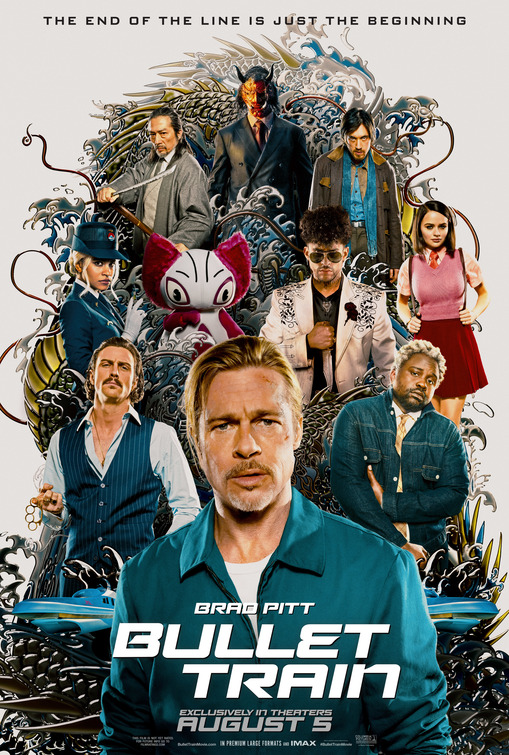Ladybug (Brad Pitt) is an unlucky assassin who’s recently sought to make some changes in his life. These changes have led Ladybug to attempt to do his job peacefully this time. After replacing another “colleague” at the last minute, Ladybug finds that the job onboard the bullet train is far more complicated than he could’ve imagine. There are various disparate characters onboard, each with competing agendas and their own lethal ambitions.
Bullet Train aims to be an audience pleasing affair with aspirations of reaching Quentin Tarantino and Guy Ritchie heights. The question is, does this action romp reach those impressive benchmarks or go off the rails?
From a score and soundtrack perspective, the film easily deserves the Tarantino comparison. British composer Dominic Lewis delivers his finest work yet on this film, with every cue holding a unique tonal DNA that works hand-in-hand with the outstanding cinematography. Lewis gives Bullet Train its edgy and oftentimes psychedelic feel, and I would argue his score is the most unique sounding since Cristobal Tapia de Veer brilliant work on HBO’s The White Lotus.
Screenwriter Zak Olkewicz (Fear Street: 1978) does his best at capturing the Tarantino/Ritchie dialogue, and he succeeds in places. The more creative entanglements that Olkewicz crafts involve a fight that must take place silently and a snake bite / anti-venom bit that is truly captivating and fun.
It’s no small feat how Olkewicz juggles roughly a dozen characters and nearly everyone gets a flashback or origin story, many of them acting as extensions of scenes (from alternate character perspectives).
However, the most intriguing element of this film isn’t its plot, or the plight of Pitt’s “sworn-off-killing” gun-for-hire… it’s the mystery-elements presented. How do all the different characters relate to one another? Where have they crossed paths before?
The movie is constantly reshuffling and transforming, allowing for new perspectives and surprising backstories to unfold. This storytelling malleability is certainly engaging, and the film makes great use of needle drops, playing a variety of hit 70s and 80s songs as Japanese-language covers.
However, the characters here are nowhere near as distinct as those in Snatch or Reservoir Dogs. While Pitt is marketed as the film’s lead, it’s much more of an ensemble led by Lemon (Brian Tyree Henry) and Tangerine (Aaron Taylor Johnson).
Their longstanding friendship and snappy banter create a silly but believable “bromance.” Lemon and Tangerine end up becoming the heart of the movie, which should be a concern if the audience isn’t connecting most strongly with the film’s protagonist.
Director David Leitch (Atomic Blonde, Deadpool 2) is unquestionably the go-to director in the action genre, and he surpasses Tarantino and Ritchie with his choreography and camerawork. Unfortunately, the film stumbles to connect on a deeper level as its focus remains on the relentless quips and violence, ultimately providing a sloppy and uninteresting ending. Another pass on the script might have made this one worthy of repeat viewing down the line.
General audiences will be pleased to see Pitt having fun onscreen, and the film’s cameos will garner a lot of good will for this Sony release. However, it’s nowhere near the fun Pitt had during his brief stint in The Lost City.
Letter Grade: C



